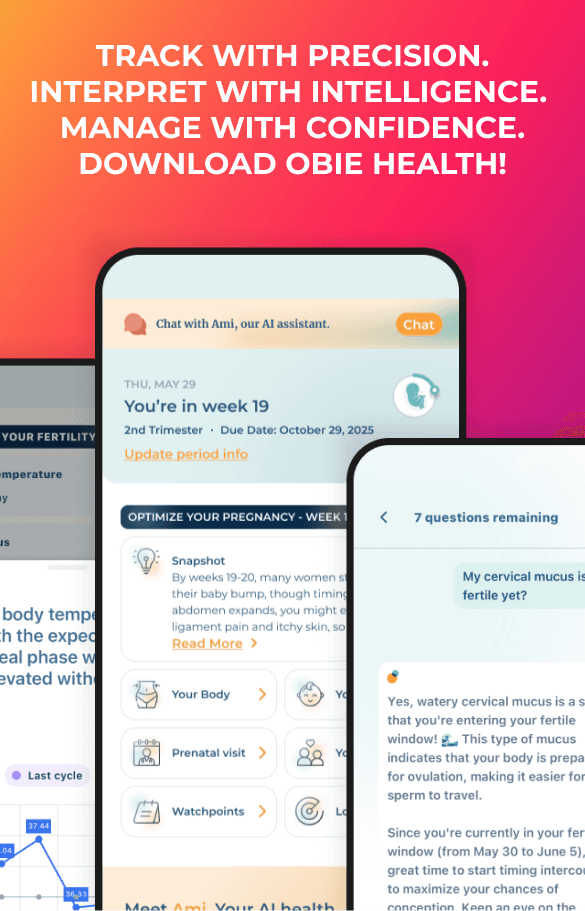Tracking Your Period Could Help Protect Your Heart Health
Obie Editorial Team

When it comes to cardiovascular health, most of us think about blood pressure, cholesterol levels, and family history. But another important indicator hiding in plain sight is your menstrual cycle. Irregular, painful, or absent periods may be more than just a reproductive concern—they could be early warning signs of heart and vascular issues down the road.
As more women use menstrual tracking apps and become attuned to their cycles, we’re discovering that period health is an often-overlooked piece of the cardiovascular puzzle. Especially for women in their 30s and 40s, understanding and monitoring menstrual patterns can be a powerful tool for early prevention.
The Menstrual-Cardiac Connection
Menstrual health reflects the balance of hormones that impact nearly every system in the body, including the heart and blood vessels. Conditions like polycystic ovary syndrome (PCOS), premature ovarian insufficiency (POI), and even persistent cycle irregularities without a clear diagnosis are increasingly linked with higher risks of:
- Hypertension (high blood pressure)
- Atherosclerosis (hardening of the arteries)
- Stroke
- Coronary artery disease
Hormonal disruptions that cause irregular periods can also influence insulin resistance, weight gain, and systemic inflammation—all contributors to cardiovascular disease. These changes don’t just appear suddenly in older age. In many women, the early signs begin showing up in the form of menstrual irregularities during their reproductive years.
Why Cycle Tracking Matters
This is where cycle tracking can serve as a valuable, accessible form of preventive health monitoring. In recent years, period tracking apps have made it easier than ever to monitor one's cycle, symptoms, and patterns over time.
Beyond fertility planning, these tools can help identify trends that may warrant further medical evaluation. A cycle that is consistently shorter than 21 days, longer than 35 days, or frequently missed altogether should not be dismissed as merely inconvenient or normal for you, especially if it’s a change from your usual pattern.
Apps that allow users to log physical symptoms like chest discomfort, fatigue, or shortness of breath during certain phases of the cycle can also help connect seemingly unrelated dots.
What to Look Out For
Being proactive doesn’t mean panicking over every cramp or delay, but it does mean paying attention. Consider tracking the following aspects of your cycle:
- Cycle length consistency (how many days between periods)
- Flow intensity and duration
- PMS and mood changes
- Energy levels and exercise tolerance throughout the month
- Any new or worsening symptoms, especially cardiovascular-related signs (e.g., heart palpitations, dizziness)
If you notice persistent irregularities or new symptoms, it may be time to talk to a healthcare provider—not just a gynecologist, but also a primary care doctor or cardiologist if heart-related symptoms are involved.
Practical Prevention Strategies
Here’s how to use cycle tracking as a form of cardiovascular prevention:
- Track at least three consecutive months of cycles with the Obie app for baseline patterns.
- Use apps that allow symptom logging alongside cycle dates.
- Bring your data to your healthcare provider if you notice persistent changes.
- Ask about blood pressure, cholesterol, and glucose testing if you have PCOS or cycle irregularities.
- Maintain a heart-healthy lifestyle with regular exercise, a balanced diet, and stress management, especially if your cycle indicates a possible hormonal imbalance.
A Holistic View of Women’s Health
Menstrual cycles offer a unique, built-in report card on overall health. Rather than treating them as separate from cardiovascular wellness, we should view them as interconnected. By normalizing the conversation around menstrual tracking for health—not just fertility—we empower women to take earlier, more informed action to preserve heart health.
Healthcare providers are increasingly recognizing that when women say, “My cycle is off,” it’s not just a reproductive concern—it could be the first clue in a much larger picture of long-term wellness.
Sources:
Worsfold L, Marriott L, Johnson S, Harper JC. Period tracker applications: What menstrual cycle information are they giving women? Womens Health (Lond). 2021 Jan-Dec;17:17455065211049905. doi:10.1177/17455065211049905. PMID: 34629005; PMCID: PMC8504278.
Schantz JS, Fernandez CSP, Anne Marie ZJ. Menstrual Cycle Tracking Applications and the Potential for Epidemiological Research: A Comprehensive Review of the Literature. Curr Epidemiol Rep. 2021 Mar;8(1):9-19. doi:10.1007/s40471-020-00260-3. Epub 2021 Feb 20. PMID: 34055569; PMCID: PMC8162175.







